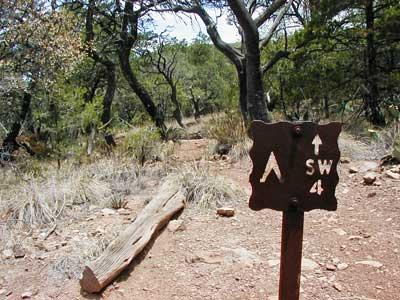Dramatic rescues employing helicopters and highly-trained crews have become almost commonplace from high mountains, deep canyons and other challenging terrain in parks across the country, but sometimes the solution to an emergency requires a return to the basics, including a trio of hardy park employees…and a mule.
The Chisos Basin is a popular destination in Big Bend National Park, and for good reason. The natural bowl lies at an elevation of about 5,400 feet and is surrounded by rugged cliffs and peaks, including Emory Peak, the highest point in the park at 7,832 feet.
By Texas standards, this is the high country, and trails from the Basin offer access to some fine backcountry hiking and camping in the surrounding area known as the High Chisos. The park website notes, "If it is scenery, solitude, or serenity one seeks the Chisos will deliver. Over 15 miles of mountain trails offer excellent views of the Chisos, desert panoramas, the Rio Grande, and far into Mexico. The only sounds you will hear are the birds, wind and the crunch of gravel under your boots."
The solitude in the High Chisos can be magnificent… but it's a tough place to have a medical emergency.
During the early morning hours of Sunday, October 23, a park visitor hiked out of the backcountry and placed a 911 call for medical assistance for his companion, who was camped in the High Chisos at a place named Laguna Meadows.
According to a park report, Supervisory ranger/ park medic Michael Ryan responded and "expeditiously made his way up the steep trail in the darkness to the site."
An "expeditious" trip on this route definitely requires some grit. The Laguna Meadow Trail begins more than a mile above sea level and has an elevation gain of 1,600 feet in 3.3 miles.
While en route, Ryan had asked for a park packer to join him with a mule team. Shortly thereafter, packer Joseph Moyer and his mule, Cash, made their way up the mountainside in the dark.
When Ranger Ryan arrived at the campsite he found a 19-year-old woman experiencing severe abdominal pain, nausea and vomiting. This was a time and place where a helicopter evacuation wasn't an option, so the woman was stabilized, secured on Cash, and evacuated out of the backcountry. She reached a waiting ambulance at sunrise.
A demanding job in the dark of night, but "all in a day's work" wasn't quite over for Ranger Ryan, packer Moyer, or a mule named Cash.
Fourteen hours later, as the sun was setting, the park received another 911 call for assistance in the High Chisos, this time from Southwest #4 campsite, the furthest and most remote campsite in the Chisos Mountains.
Ryan, Moyer and Cash responded back up the steep trail once again, joined this time by ranger Scott Taylor. Due to the remote location, it took several hours of vigorous night hiking to reach the site, where they found a 20-year-old man with incapacitating abdominal pain that was later determined to be a splenic infarction. This patient also was stabilized and evacuated.
Allen Etheridge, Chief Ranger at Big Bend, notes that while medical evacuations are common at the park, night evacuations in the high Chisos are rare, especially if they are made by the same response crew within a few hours time.
High-tech rescues are fine when they're possible, but in situations like this, there's just no substitute for Cash … and for employees like Ryan, Moyer and Taylor, who'll go a lot more than an extra mile—even in the dark.


 Support Essential Coverage of Essential Places
Support Essential Coverage of Essential Places






